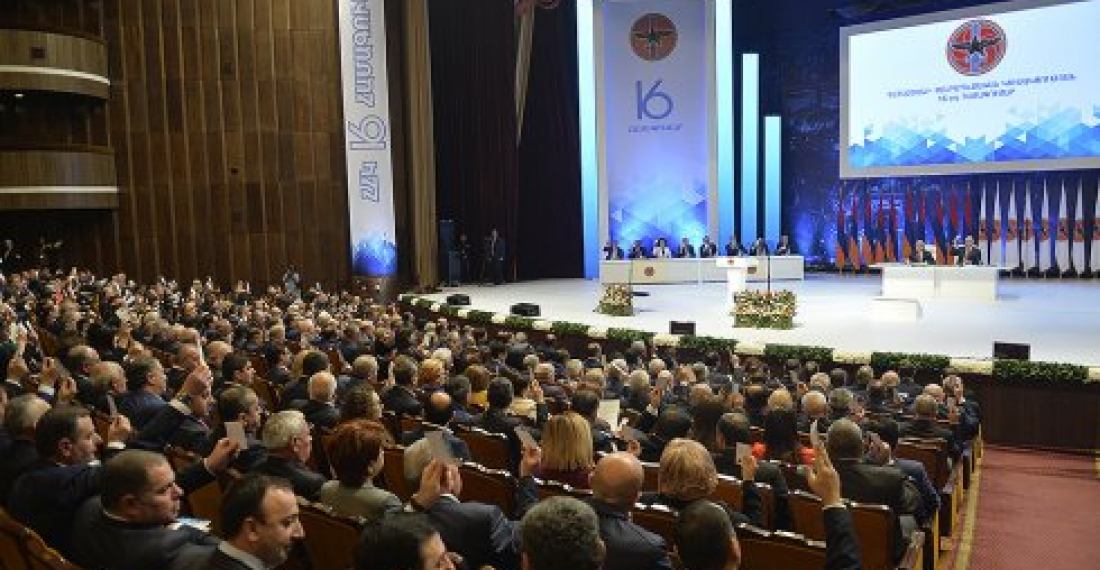Serzh Sargsyan told the congress of the ruling RPA "as long as the status of Artsakh remains uncertain, no other issue can be solved" since this was the main problem, and everything else was "collateral"
Armenian President Serzh Sargsyan on Saturday (26 November) gave a wide-ranging speech at the opening of the 16th Convention of the ruling Republican Party of Armenia (RPA), of which he is also Chairman.
After dealing with a number of domestic and international issues, President Sargsyan used the speech to set out the Armenian position regarding how the conflict over Nagorno-Karabakh can be resolved, stressing that defining the status of Nagorno-Karabakh must come first, and that everything else is, according to the official English translation of the speech published on the President's website, "collateral". This seems to contradict what has so far seemed to be the understanding within the ongoing negotiations facilitated by the OSCE Minsk group co-chair, that a step-by-step approach will lead to a decision on the final status, as a last issue to be defined.
The website of the Armenian president carried an English translation of the speech in which the president is quoted as saying the following:
"Our position remains unaltered: the problem of Nagorno-Karabakh can be solved exclusively through the free self-determination of the people of Artsakh. All other problems are collateral. All other issues will find their logical and fair solution, in parallel with the resolution of the problem. As long as this main problem exists, as long as the status of Artsakh remains uncertain, no other issue can be solved".
This statement seems to exclude the possibility that a peace plan can be implemented that will see Armenia release territories it has occupied around Nagorno-Karabakh back to Azerbaijan, for an interim status to be agreed, and for discussions and decisions on a final status for Karabakh to be dealt with as the final stage of the package.
Commonsapce.eu political editor said in a comment that this leaves the so-called "Madrid principles," that have been long flaunted as the sine qua non of a Karabakh peace process, in something of a limbo, Furthermore, it leaves the so-called "Lavrov ideas", the carefully crafted variation of the Madrid principles which have somewhat superseded the latter as the basis for negotiations, but which have never been made public, in tatters. They have been assumed to include a provision for Armenian withdrawal from some of the territories around Nagorno-Karabakh as a first step, leaving the issue of status for later.
With the Foreign Ministers of the two countries expected to meet in Hamburg around 8 December, on the margins of the Ministerial Council of the OSCE, it is now not clear what are going to be basis of those discussions.
Only recently, Azerbaijani President Ilham Aliev, in a reference to the status of Nagorno-Karabakh in the framework of a conflict resolution agreement, said that the maximum level of autonomy that Azerbaijan was ready to envisage was that of an autonomous republic within Azerbaijan, This also at the time seemed to be jumping the gun, since discussions up to now had been based on the assumption that the final status of Nagorno-Karabakh would be decided by plebiscite, as the final step in a peace agreement. It could be that both leaders are simply setting markers for the discussions, and are willing to be more flexible in the course of negotiations. Given the history of these negotiations however this is unlikely."
You can read the full version of the speech of president Serzh Sargsyan to the 16th Convention of the republican Party of Armenia, held in Yerevan on Saturday, 26 November 2016, on the website of the Armenian presidency here.
Source: commonspace.eu with the press service of the president of Armenia







